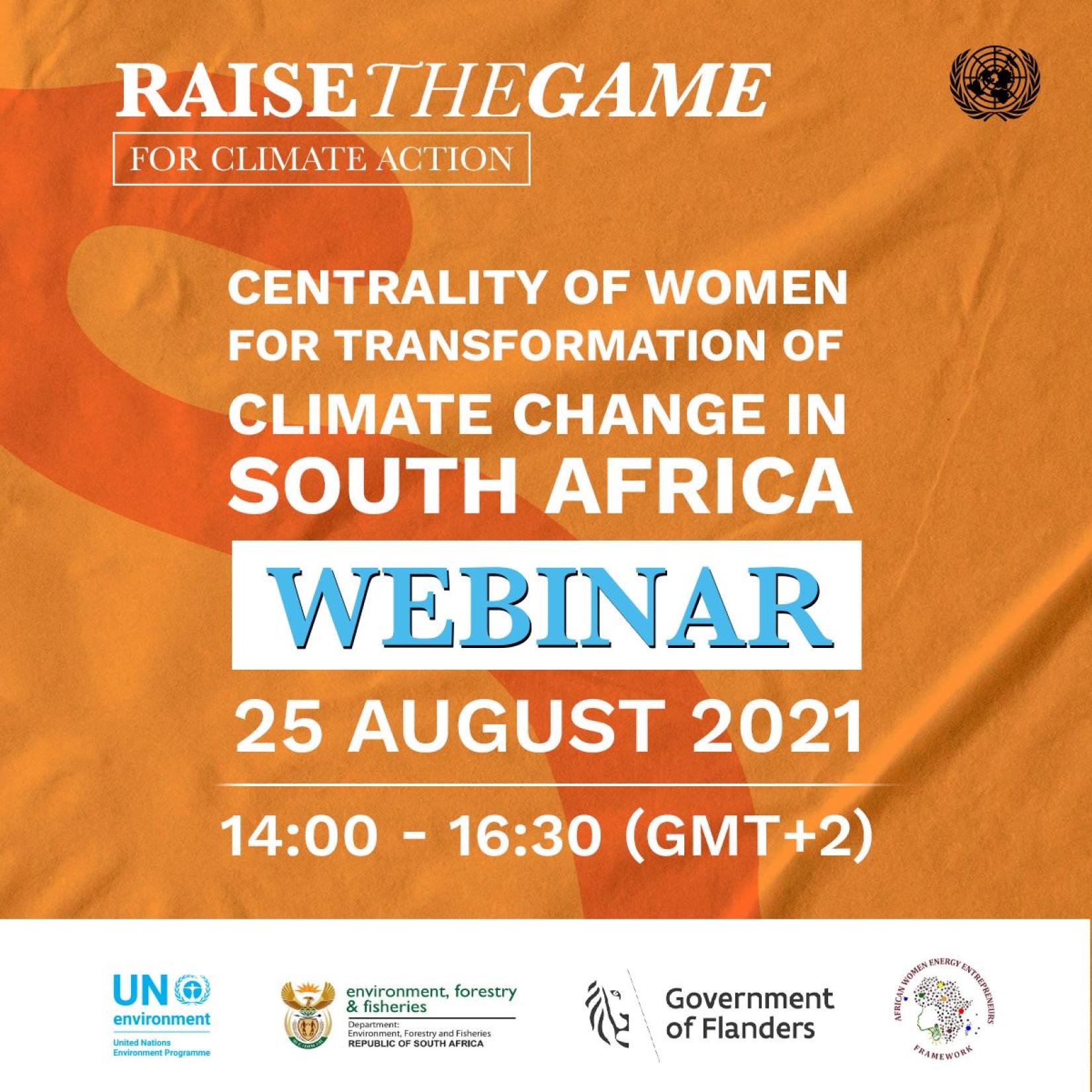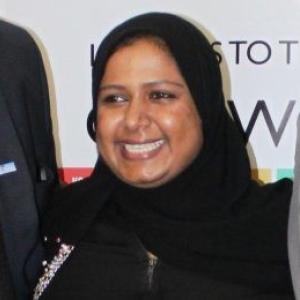Raising the Game: Centrality of Women to transform Climate Action in South Africa “Do Better, Do More, Do Quick, Do Together”
25 August 2021
- “Raise the game on Climate Action” is organized in the context of joining forces to the Campaign of Climate Action and the Women’s Month celebration in South Africa, and celebrate the social, economic, cultural and political achievements of women in the Clean Energy and Ecosystem based Adaptation (EBA) space.

Pretoria, 25 August 2021 – Today UNEP is hosting the Webinar titled Raising the Game: Centrality of Women to transform Climate Action in South Africa. In attendance are all players in climate action from South Africa and beyond; including AU, RECS (e.g. SADC), members of the UN Country Team (UNCT) SA; implementing partners; civil societies, academic and research institutions, financiers, private developers, policy makers, energy enthusiasts, representatives from the women’s organization and development partners who have been involved in the energy, agriculture, industry and women economic empowerment in Africa. The Webinar is scheduled for Wednesday the 25th of August 2021 @ 14:00-16:30 (SAT).
This Webinar – under the theme: “Raise the game on Climate Action” is organized in the context of joining forces to the Campaign of Climate action and the Women’s Month celebration in South Africa, and celebrate the social, economic, cultural and political achievements of women in the Clean Energy and Ecosystem based Adaptation (EBA) space.
The webinar will provide an opportunity to discuss innovative solutions which can promote Climate Action in terms of Eco-based system of Adaptation as well as Mitigation in South Africa for its various catalytic sectors, with women at the forefront of this process.
In this webinar, well renowned panellists representing national, regional and global world will share their best practices and experiences on innovative environmental and enabling solutions such as Policy, technology, finance etc. to drive the low carbon, resource efficient and Climate resilient systems. Regional platforms that focusses on empowerment of women will also intervene and share various means of implementation for advancing women in various catalytic sectors to transform climate action. Further, women entrepreneurs from various African geographical location including South Africa will also witness and provide evidence on the significant contribution of women in transforming climate action in various sectors.
In the recent past, South Africa has experienced devastating impacts of climate induced hazards such as storms localized floods, prolonged droughts, heat waves and wildfires. These extreme weather events have been happening more frequently and at increased intensities. Cape Town nearly succumbed to its worst drought in more than a century, whilst significant parts of South Africa, Botswana, Namibia and Zimbabwe have all recently experienced periods of prolonged drought, and Mozambique and the south eastern regions of Zimbabwe have been devastated by tropical cyclones and associated floods. These events have wreaked havoc across all sectors (i.e. agriculture, transport, biodiversity and ecosystems, water, and human settlements), with lasting implications on water security, energy security and food security (WEF nexus), both at household and community levels.
As underlined by the UNEP Executive Director, Ms Inger Anderson, “extraordinary extremes now clearly stand in the way of a normal life.” Worse still, these Climate-induced challenges are just a pale foreshadowing of what is to come, unless we treat Climate Change as the existential threat that it is, and “raise the game” for climate action. We either turn the corner on climate action and turbo charge the full-scale transition to decarbonization or face unimaginable devastation, says Inger.
South Africa’s over-reliance on coal, comprising around 80 percent of the country’s energy mix, places the country among the world’s top carbon emitters and does huge damage to the socio-economic welfare and the health of its citizens (USAID, 2021). Load shedding, a well-known phrase across the South African public, has become a characterizing feature of economic hardship in the country. Issues such as social equity and economic efficiency within the context of sustainable development, and the choice of appropriate policy instruments to minimize negative impacts of fossil fuels associated with energy production and consumption, become crucial. A developmental priority is therefore a transition from highly centralized energy production that depends on diminishing reserves of fossil fuels towards decarbonized and decentralized production of renewable, clean energy.
In the context of Africa in general and South Africa in particular, there is a need to amplify mitigation and adaptation efforts, whilst simultaneously address: emissions reduction and energy transition, economic growth and poverty alleviation, inclusivity, and benefit-sharing, as well as women and youth empowerment.
Women play a crucial role in the adoption of clean energy cooking solutions. As the primary energy managers in households and communities in developing countries, women can be powerful agents for change in the transition to sustainable energy and economic development. However, women energy entrepreneurs face a range of gender-specific barriers. Consequently, the potential of women as entrepreneurs is under-utilized. The existing gender gaps in access to (a) finance, (b) information, (c) technology, (d) goods and services, and (e) markets translate into additional investment risks. Addressing these gender-differentiated risks will unleash the potential of women entrepreneurs in sustainable energy and contribute towards the achievement of the sustainable development goals.
Note to Editors:
Objectives: The main objectives of this webinar are to (i) Respond to the urgent need of climate action by joining forces to the country’s campaign on ‘Raise the Game for Climate Action’ that was launched in July 2021 with a view to Educate, Inspire and Activate. (ii) Celebrate the work being done by women, as drivers and /agents of change and transformers of climate action by showcasing women-owned and, driven climate smart, innovative enterprises in various parts of the African countries; and (iii) galvanize transformation action (mitigation and adaptation) that contributes to the socio-economic and environmental aspects in terms of job creation, income generation, increase productivity and spur economic growth (iv) pave the way for developing a concrete pilot project(s) on the basis of the identified gaps and challenges during the webinar develop innovative environmental and solution action plans for better livelihoods and well-being of societies in South Africa
Expected Output: (i) Awareness and ownership created in the Campaign of Climate action and women’s empowerment; (ii) Advocacy on gender responsive actions by public and private sector actors to influence climate policy and mitigation strategy enhanced; (iii) Platform for dialogue between women entrepreneurs and relevant stakeholders to identify and proffer solutions to effects of climate change in the society created; (iv) Gender sensitization and mainstreaming in climate change mitigation strategy enhanced; (v) Best practices shared and lessons learnt among various Africa geographic locations; (vi)Challenges and gaps in terms of Policy, technology, capacity and skill as well access to finance and market identified; and (vii) Focus areas for the pilot projects identified
Social Media Handles:
- @UNEPAfrica
- @UNSA
- @ENVIROMENT_SA
Using the following Hashtags:
- #RaiseTheGame4ClimateActionRSA
- #ClimateResilience
- #ClimateChange
- #GenerationRestoration
For further enquires contact: Zeenat Abdool: Associate Public Information Officer, United Nations Information Centre, Pretoria ,Email: abdool@un.org


















